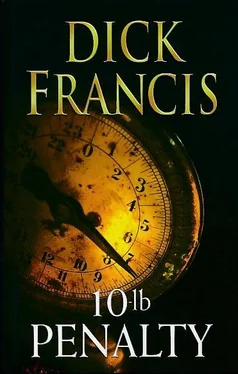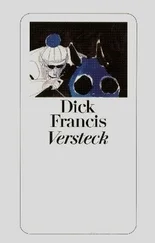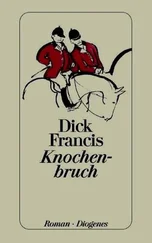Dick Francis - 10 lb Penalty
Здесь есть возможность читать онлайн «Dick Francis - 10 lb Penalty» весь текст электронной книги совершенно бесплатно (целиком полную версию без сокращений). В некоторых случаях можно слушать аудио, скачать через торрент в формате fb2 и присутствует краткое содержание. Город: London, Год выпуска: 1997, ISBN: 1997, Издательство: Michael Joseph, Жанр: Триллер, на английском языке. Описание произведения, (предисловие) а так же отзывы посетителей доступны на портале библиотеки ЛибКат.
- Название:10 lb Penalty
- Автор:
- Издательство:Michael Joseph
- Жанр:
- Год:1997
- Город:London
- ISBN:978-0-7181-4245-2
- Рейтинг книги:3 / 5. Голосов: 1
-
Избранное:Добавить в избранное
- Отзывы:
-
Ваша оценка:
- 60
- 1
- 2
- 3
- 4
- 5
10 lb Penalty: краткое содержание, описание и аннотация
Предлагаем к чтению аннотацию, описание, краткое содержание или предисловие (зависит от того, что написал сам автор книги «10 lb Penalty»). Если вы не нашли необходимую информацию о книге — напишите в комментариях, мы постараемся отыскать её.
10 lb Penalty — читать онлайн бесплатно полную книгу (весь текст) целиком
Ниже представлен текст книги, разбитый по страницам. Система сохранения места последней прочитанной страницы, позволяет с удобством читать онлайн бесплатно книгу «10 lb Penalty», без необходимости каждый раз заново искать на чём Вы остановились. Поставьте закладку, и сможете в любой момент перейти на страницу, на которой закончили чтение.
Интервал:
Закладка:
We also arranged cover for stable yards, all buildings, personal accident, public liability, fire, theft and measles. Anything for everyone. As agents, we kept underwriters busy.
I did abominably miss my days’ early mornings on Sarah’s Future, but as dawn grew later and colder towards winter, I would have found, as I had the previous year, that only weekends gave me much scope.
As for riding in races, I was lucky in that: the Northamptonshire trainer who’d taken the chestnut phoned me one day to say an owner of his, a farmer, wanted a free jockey — in other words, an amateur — for a runner he thought had no chance.
Why run it, I thought? I happily took the ride and plugged away, and the horse finished third. Delighted, the farmer put me up again, and although I never actually won for him, I got handed around to his friends like a box of chocolates, and cantered down to a start somewhere most Saturdays.
It wasn’t the same without Sarah’s Future, but I wasn’t ready to try to replace him, even if I could have afforded it. One day, I thought. Perhaps. When I’d paid off the installments on a car.
I had rationalized my liking for speed. Taking intoxicating risks was normal in growing up. Warrior genes were inbred: it was necessary to fight the birch fences and the ski slopes, perhaps, in lieu of war.
Nearing Christmas, my father said we’d been invited to a reception at No. 10 Downing Street — himself, Polly and I — for the customary jolly given by the current prime minister to the members of his Cabinet and their families.
Polly wore a reasonable dress and my father hired a chauffeur, and the Juliards in good formation walked through the famous front door.
Staff greeted my father as one who belonged there. Polly had been through the portals before, but I couldn’t help but feel awed as I trod through the crimson-walled entrance hall over the black-and-white squared floor and through into the inner hall and up the historic staircase in a river of other guests. The brilliant yellow staircase wall, going up around a central well, was hung with portraits of all the past prime ministers; and I knew from the friendly way he looked at them that my father would try his best to join them one of these days.
Never mind that there were about twenty other Cabinet ministers with the same dream, let alone all the “shadow” ministers in the opposition: one never got to hang on that wall without ambition.
The reception was chattering away in the large formal area upstairs known as the pillared drawing room. (It had pillars. Two.)
We were greeted sweetly by Mrs. Prime Minister — her husband was bound to arrive shortly — and were wafted onwards to trays of filled glasses and tiny Christmassy mince pies surrounded with holly.
I no longer asked annoyingly for Diet Coke. I drank the prime ministerial champagne and liked it.
I knew almost no one, of course, even by sight. Polly kept me in tow for a while, though her husband had drifted away as if on wheels, greeting and laughing and making no enemies. Polly could identify all the Cabinet after eighteen months with my father, but knew none of them — as Orinda would have done — as “daaahling.”
The prime minister did arrive (he was bound to, after all) and my father saw to it that the great man shook Polly’s hand with warm recognition and mine with at least a show of interest.
“You win races, don’t you?” he asked, brow furrowed.
“Er... sometimes,” I said weakly.
He nodded. “Your father’s proud of you.”
I did, I suppose, look astounded. The prime minister, a gently rounded man with a steel handshake, gave me an ironic smile as he passed to the next group, and my father didn’t know whether or not to call him a liar.
Dearest Polly squeezed my arm. “George doesn’t say he’s proud of you. He just certainly sounds it.”
“That makes us equal.”
“You really are a dear boy, Benedict.”
“And I love you, too,” I said.
My father’s attention had purposefully wandered. “You see that man over there?”
There were about twenty men “over there.”
Polly said, “Do you mean that one with flat white hair and circular eyes? The Home Secretary?”
“Yes, dearest. But I meant the one he’s talking to. The one who’s looking presidential and suitable for high office. He’s Hudson Hurst.”
Polly shook her head. “Surely not. Hudson Hurst has an oiled black ponytail and one of those silly little black mustache-and-beard combinations that frame a man’s mouth and distract you from what he’s saying.”
“Not anymore.” My father smiled, but not with joy. “Someone must have persuaded Hudson Hurst that the topiary work was a political no-no. He’s cut off the hair and shaved off the beard. What you see now are the unadorned petulant lips of the defense secretary, God help us all.”
Five minutes later my father was putting a seemingly affectionate hand on the defense secretary’s shoulder and saying, “My dear Hud, have you met my wife and my son?”
Love thine enemies...
I hated politics.
“Hud” had a damp, cold handclasp that I supposed he couldn’t help, and if he had lately had an oiled black ponytail and a black mustache-beard mouth-circling combination, they had very likely been dyed. His present hair color was the dark-lightly-flecked-with-gray that a passing girlfriend had told me couldn’t be faked, and he’d had a cut in a swept-back and duck-tailed style straight from the films of James Bond. Distinguished. Impressive, one had to admit. It inspired trust.
My father’s own mat of natural dark, close curls was cut to display to advantage the handsome outline of his skull. Expert stuff. Ah well.
Hudson Hurst was overpoweringly pleasant to Polly. Smile and smile, I thought, remembering Hoopwestern: smile and smile and shake the hands and win the votes. He flicked me a glance, but I wasn’t important.
Sweet Mrs. Prime Minister appeared at my elbow and asked if I was having a good time.
“Oh, yes. Splendid, thank you.”
“You look a bit lost. Come with me.” She led me across to the far side of the big room and stopped beside a sharply dressed woman who reminded me strongly of Orinda. “Jill, dear, this is George Juliard’s son. Do look after him.”
Jill gave me a comprehensive head-to-toe and stared at Mrs. Prime Minister’s retreating back without enthusiasm.
“I’m really sorry,” I said, “I don’t know your name.”
“Vinicheck. Education.”
“Minister of?”
Her grim lips twitched. “Certainly.”
She was joined by another woman in the simplest and best of current fashion: another Orinda-clone. Secretary of state for social security.
She said bluntly, “Where does your mother get her clothes?”
I followed her gaze across the room and saw Polly talking unselfconsciously to the man with flat white hair and circular eyes: the home secretary. Polly’s clothes, as always, had nothing to do with popular opinion but very clearly revealed her individual character.
Jill Vinicheck (education) kindly said, “Your father may have a bright career in front of him, but your mother will have to change the way she dresses or she’ll be clawed to bits by those bitches who write about fashion in the newspapers.”
The minister of social security agreed. “Every woman in politics gets the hate treatment. Haven’t you noticed?”
“Oh, not really, no.”
“Your mother’s skirt is the wrong length. You don’t mind me telling you? I’m only being helpful. Frankly, it would be the wrong length whatever length it was, according to the fashion bitches. But you can pass on some tips to her from us, if you like.”
“Er...”
Читать дальшеИнтервал:
Закладка:
Похожие книги на «10 lb Penalty»
Представляем Вашему вниманию похожие книги на «10 lb Penalty» списком для выбора. Мы отобрали схожую по названию и смыслу литературу в надежде предоставить читателям больше вариантов отыскать новые, интересные, ещё непрочитанные произведения.
Обсуждение, отзывы о книге «10 lb Penalty» и просто собственные мнения читателей. Оставьте ваши комментарии, напишите, что Вы думаете о произведении, его смысле или главных героях. Укажите что конкретно понравилось, а что нет, и почему Вы так считаете.












